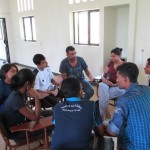David Bahena’s pilgrimage with God’s Word
 I became a Christian when I was 16 and my life was turned around – I experienced joy and suddenly had a purpose in life. At the same time, I was hungry for reading the Bible and my journey with Scripture began then and there.
I became a Christian when I was 16 and my life was turned around – I experienced joy and suddenly had a purpose in life. At the same time, I was hungry for reading the Bible and my journey with Scripture began then and there.
At COMPA (IFES movement in Mexico), I learnt how to study, share and contextualise God’s Word. I belong to a generation who grew up studying the Bible inductively and taking part in workshops with Ada Lum. Samuel Escobar, in “Así leo la Biblia”, describes it like this: “learning to observe the text with clarity, interpreting its message and applying it to our personal lives.” Then came the time to share the Word with my fellow university students. It was such a joy to see my friends meeting Jesus in these small groups and being transformed by God’s Word. Also, because of our reality in Latin America, we were taught how to apply it to our context. It is relevant to the academic world, and to our country’s social, political and financial reality.
After serving as student staff we went through a time of spiritual dryness and renewal. As the staff had to prepare so many workshops, sermons and Bible studies, we were risking turning the Bible into a mere work tool. We read and studied God’s Word but we weren’t feeling passionate about it anymore. So much so that after serving for three years as General Secretary, I confessed to Douglas Stewart that I didn’t feel like reading the Bible or praying, and that I didn’t understand what was happening to me. God opened a new spiritual path of renewal centred on his Word. This new way of approaching Scripture included meditation, prayer and retreat. It was a time of learning how to pray with God’s Word and in the Spirit, and I was gradually transformed and renewed.
My calling in life has also been shaped by Scripture. In summer 2003, at Cedar Campus, whilst God was restoring our marriage, we were invited to cultivate the kind of spirituality that is humble, rooted in the Bible and in the power of the Holy Spirit (Matthew 12:18-21). Years later, God rebuilt my sense of identity, helped me to see that I was much more than just a member of staff and invited me home to cultivate the kind of spirituality that makes you a better parent, friend and citizen (John 4:46-54). Once again, last year in Pasadena, God renewed us and gave us rest, and we were invited to cultivate the kind of spirituality that flourishes through adversity and the desert (1 Peter 1:3-5). God is calling us to work alongside a generation of emerging leaders, to facilitate an encounter with the Lord that is Bible-centred, modelling humble and transparent leadership, strengthening basic relationships in life and the family, and persevering even through adversity.
David Bahena
David serves in IFES as Regional Secretary for Latin America


 After each of these ‘retreats’, I came back with a fresh mandate! A clearer calling of how to proceed. For me, these retreating times are not an option, but an oasis where I can drink deeply and make space for life. So, I know for myself, 2017 was a year of ‘hard knocks & tough schooling’, yet it was the year I am certain ‘he carried me on eagle’s wings & sang his song over me by night.’
After each of these ‘retreats’, I came back with a fresh mandate! A clearer calling of how to proceed. For me, these retreating times are not an option, but an oasis where I can drink deeply and make space for life. So, I know for myself, 2017 was a year of ‘hard knocks & tough schooling’, yet it was the year I am certain ‘he carried me on eagle’s wings & sang his song over me by night.’
 Read one of these psalms, written by Axel Aurenche Gbelia, a student from the Ivory Coast:
Read one of these psalms, written by Axel Aurenche Gbelia, a student from the Ivory Coast: Our vision for the Mark Manuscript Bible Study Conference started in 2014; we wanted to see students who are both passionate about the Word and who know how to study and engage the Scriptures. We wanted students to meet Jesus through his Word and be transformed from within. Yet, the reality showed that our students were lacking the tools to study the Bible as individuals and with one another. So our desire was to offer them a study method which can help them feel comfortable studying the Bible with their friends and within their student groups. We believed that through this our students would also have the courage to start inviting their non-Christian friends to study the bible with them, offering them the chance to meet Jesus in his Word.
Our vision for the Mark Manuscript Bible Study Conference started in 2014; we wanted to see students who are both passionate about the Word and who know how to study and engage the Scriptures. We wanted students to meet Jesus through his Word and be transformed from within. Yet, the reality showed that our students were lacking the tools to study the Bible as individuals and with one another. So our desire was to offer them a study method which can help them feel comfortable studying the Bible with their friends and within their student groups. We believed that through this our students would also have the courage to start inviting their non-Christian friends to study the bible with them, offering them the chance to meet Jesus in his Word.



